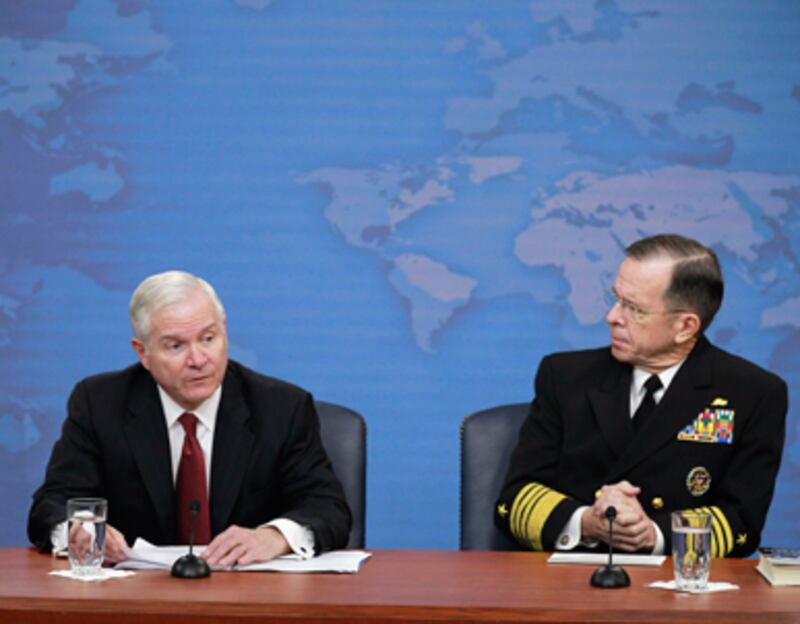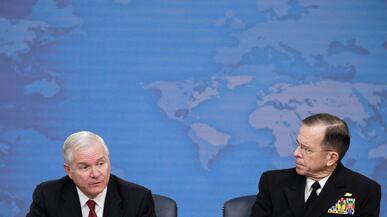As we begin a new year, the United States is at a major crossroads in foreign policy. The end of 2010 saw North Korea’s assault on the disputed Yeonpyeong Island, the revelation that Pyongyang had developed a secret, highly sophisticated uranium enrichment plant with 2,000 centrifuges, and, of course, the massive WikiLeaks dump that jeopardized diplomacy around the world.
These incidents are just a few highlights of the foreign policy complications the U.S. must deal with, in addition to the ongoing challenges to deter Iran’s nuclear ambitions, prevent al Qaeda threats from around the globe, and fight the wars in Afghanistan and Iraq. Yet for mostly good and some bad reasons, all the discussion back at home is about how to reduce defense spending, without giving any serious attention to what we need to do to maintain the strongest possible defense to meet the myriad challenges before us.
The country faces a soaring federal deficit, out-of-control government spending, and mandates from the American electorate to reduce spending, cut the deficit, and balance the budget. As the next Congress implements spending cuts to accomplish the latter, it is almost certain that the defense budget will be a prime candidate for cuts, as defense spending now constitutes about 19 percent of the federal budget and more than half of all U.S. discretionary spending. Moreover, the election of a number of new Republican members of Congress who have a profound skepticism of defense will increase pressure across the board to reduce our level of expenditures at precisely a time when our challenges, at the very least, are getting more complicated.
The United States’ defense is overstretched as it attempts to fight two wars, terrorism, and dangerous nuclear development. We are facing a national crisis, as we must figure out how to maintain a strong defense while trying to reduce defense spending.
The bottom line is that we know that cuts in defense are coming, but if those cuts are too substantial and without real thought to the full international picture, we run a grave risk to our well-being as a nation. We could compromise our position as a world leader and would potentially even undermine the capability of our armed forces.
Presently, neither the “elite” nor the general public has figured out how to make cuts without jeopardizing security and our place as a world leader.
Voters support sweeping cuts of federal spending and believe that defense can be cut, as there is no sense that the U.S. is at risk in a way that requires more defense spending. In polling I conducted earlier this month, almost half, 47 percent, say federal spending should be cut by 20 percent, and 36 percent say federal spending should be cut by at least 5 percent.
The area of federal spending voters say should be cut first is defense. Twenty-nine percent say they would reduce national security spending in order to cut government spending, according to a New York Times/CBS News poll. Further, my recent poll shows that voters favor decreasing defense spending rather than increasing it to fund the war in Afghanistan, 44 percent to 21 percent.

But while Americans want to decrease federal spending and particularly defense spending, they also want the U.S. to play a leadership role in the world. Fifty-eight percent say the United States has the responsibility to be a leader of the world, while 34 percent say the U.S. should not try to be a leader of the world, according to my poll data.
A look at opinions among elites and policy makers shows that they also lack an agreement about how defense spending should be cut. The consensus that has emerged at the elite level among Democrats on the left, Republicans on the right, and those in the center is that defense spending should be cut. The Democrats have always been hostile toward the military and prefer cutting defense spending to entitlements. Conservative Republicans and Tea Party advocates are skeptical of foreign incursions and are also willing to cut defense.
Considering our enormous deficit during a time when national security clearly must not be sacrificed, all sides are going to need to work together.
The center’s embrace of cutting defense spending is largely a result of Secretary of Defense Robert Gates. In 2009, Gates called for a significant reduction in weapons systems as part of his 2010 Defense Department budget, which amounted to $300 billion in savings. Last year, Gates advocated for personnel-related cuts by calling for sweeping cuts in defense contractors and a freeze on the growing number of senior leadership positions and written reports. Additionally, he proposed eliminating the Joint Forces Command in Virginia. Gates, however, views these cuts as a redeployment of resources rather than a reduction of defense spending. He does not support an overall reduction of the defense budget—he believes that the money saved from these cuts should be used more intelligently for alternate, high-priority needs.
Meanwhile, Erskine Bowles, co-head of the federal deficit-reduction commission established by the White House, supports Gates’ proposed defense cuts but believes that they should be permanent as part of the reduction of overall federal spending. In the commission’s proposal to cut spending and reduce the deficit, it identifies $200 billion in discretionary spending cuts by 2015, with half the savings coming from reductions to Pentagon spending.
Of the $100 billion proposed defense cuts, $28 billion would come from the overhead savings Secretary Gates has promised, assuming that these savings would be used to reduce spending rather than be used in other defense areas. Twenty billion dollars would come from reducing procurement by 15 percent and $9.2 billion would come from freezing noncombat military pay at 2011 for three years.
Gates has called the commission’s proposed defense cuts “catastrophic” and says they would hurt our defense significantly. Obama has endorsed Gates’ defense cuts and will likely endorse the deficit commission’s proposed spending cuts in some form. But Obama also has offered $4.1 billion in funding to modernize and upgrade the U.S. nuclear arsenal, which is responsive to the bipartisan Perry-Schlesinger commission, which advocated this year for an immediate upgrade of our nuclear armaments. This would add substantially and unpredictably to defense costs going forward, even though there is no sense of how this money would be appropriated by Congress. Such conflicting opinions and actions only add to the confusion surrounding this issue.
A few traditional, mainstream Republicans, backed by the Perry-Schlesinger commission, are against defense spending cuts. Rep. Buck McKeon (R-CA), who will likely be the next chairman of the House Armed Services Committee, is one high-ranking member, but overall these opinions are in the minority.
The reality is that the numerous forces that want to cut defense are colliding—Democrats on the left, Republicans and the Tea Party movement on the right, and Secretary Gates, deficit commission co-head Erskine Bowles, and Obama from the center—ensures that cutting defense will almost certainly be at the top of the next Congress’ agenda.
Unfortunately, the only thing they agree on is that cuts are necessary. In order to move forward, these sides must come together in dialogue and public debate to discern the best course forward.
We must have this debate on how and where to cut defense spending as a country and bring this discussion to the forefront of our national discourse, rather than simply rely on policymakers or the defense industry to make these decisions on their own. Washington is not known for coming together over many issues, but considering our enormous deficit during a time when national security clearly must not be sacrificed, all sides are going to need to work together. If we fail to do so, WikiLeaks will be the least of our problems this new year.
Douglas Schoen is a political strategist and author of the upcoming book Mad as Hell: How the Tea Party Movement is Fundamentally Remaking Our Two-Party System to be published by Harper, an imprint of HarperCollins on September 14. Schoen has worked on numerous campaigns, including those of Bill Clinton, Hillary Clinton, Michael Bloomberg, Evan Bayh, Tony Blair, and Ed Koch.





